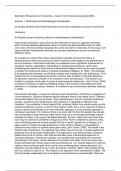Alternative Perspectives in Economics – Autumn term formative essay (Got 68%)
Seminar 1: Rationality and Methodological Individualism
(a) Assess whether instrumental rationality can provide a satisfactory account of economic
behaviour.
(b) Should economic theorists adhere to methodological individualism?
Instrumental rationality is also known as the rationality of means or cognitive rationality
which involves applying appropriate reason to choose the best possible means to attain
one's ends. Most economists recognise this as the only form of rationality. In this essay I will
assess whether instrumental rationality can provide a satisfactory account of economic
behaviour alone.
An example of a theory that utilises instrumental rationality is Consumer theory in
Microeconomics where consumers are said to maximise utility based on set preferences in
all circumstances. Instrumental rationality is considered to be a significant achievement of
economic science, especially in mainstream or neoclassical economics, which uses
simplifying assumptions to allow formal mathematical analysis which can be used to explain
or predict the choices and actions of rational individuals (Hodgson, B.,1992). The individual
is considered self-interested, not thinking of others when setting their own preferences. Their
preferences do not necessarily have to be universal, they could be for altruistic behaviour,
for behaviour harmful to oneself, or for immoral or even evil behaviour. This theory is not
limited to a singular moral code, it covers a broad range of preferences, (John Tomer, 2008).
In practise, this theory is good at predicting trends in the economy and predicting human
behaviour in a simplistic sense, however, it is difficult to see instrumental rationality reflected
in reality.
Instrumental rationality is merely too restrictive and mechanical to reflect the true patterns of
human behaviour. Empirical evidence against orthodox theory is too easily found. Orthodox
economists believe that any behaviour, even odd behaviour, fits into a general preference
function, and that by their preferences, their behaviour is regarded as rational to the
individual. If any evidence is found against their universal model, they would usually use the
empirical evidence to call for a reform of the original model, but in many cases the evidence
may be used to shift attitudes to a more heterodox approach, as the orthodox approach is
not always successful. For instance, there is an issue with the fact that people may actually
have knowledge of ends and they might not be fixed, plus, not enough knowledge may be
available of means in the case of bounded rationality. By this, I mean that more often than
not it may be rational to sometimes change your mind. Hume considered a person’s ends,
one’s motivating passions to work outside the rule of reason, people do not always try to
apply reason to assess the appropriateness of their actions. Reason is only applied to
choose the best means to achieve these given ends (John Tomer, 2008). The model is too
deterministic of behaviour, this approach can elude a loss of free will. It models people like
programs that can be easily manipulated. This approach is very dehumanising. Austrians
believe that we do of course, have free will and take a less mathematical approach to
economic behaviour. Keynes for example, uses fundamental uncertainty and humanism
consistently in his theory. Human behaviour is not black and white. There are many more
things that determine human actions than just preferences. Our choices depend on what we
need as well as what we want which can be very conflicting when making decisions. Our
behaviour can also depend on our norms and values, routines, habits, and procedures that
are very unique for each of us. This relates to the argument of the prevalence of habits. The
fact that people supposedly have a complete set of preferences is questionable, there can




